BRANDED CONTENT
From cinema manager to prison officer: His mid-career switch to rebuild lives
A chance advertisement at his former workplace led him from managing films to corrections work – today, he leads a team helping over 300 ex-offenders start afresh
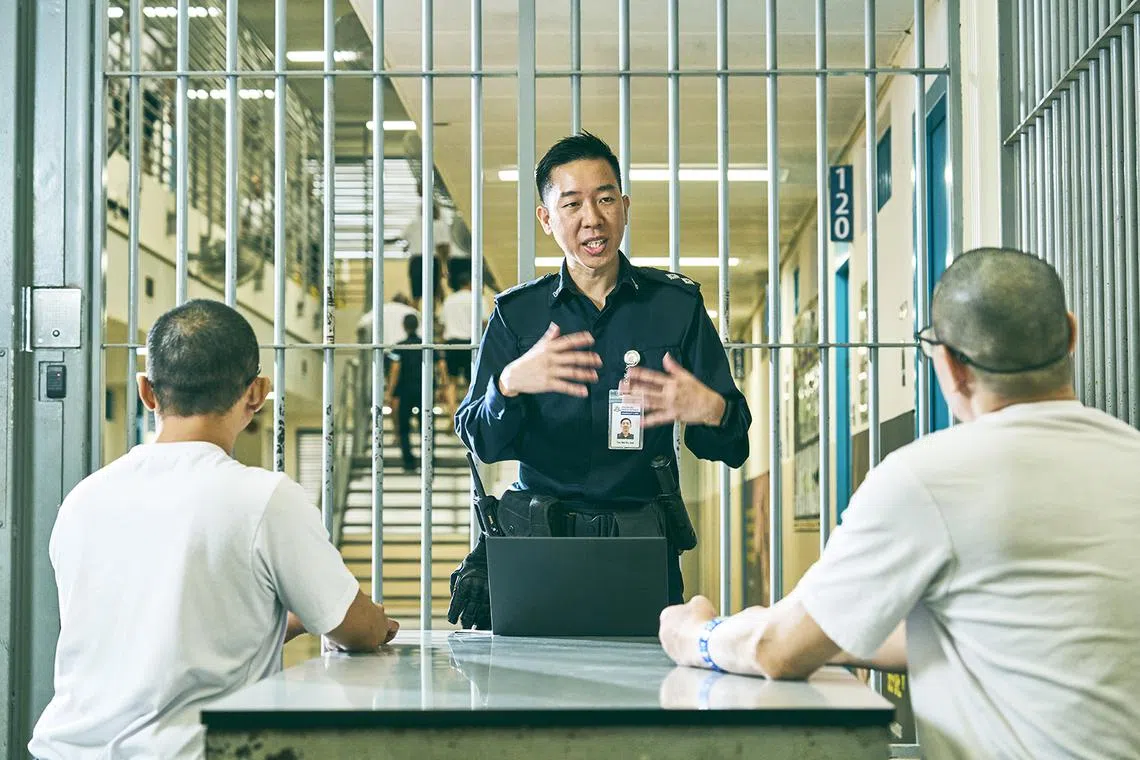
As a Rehabilitation Officer, Mr Joel Tan is dedicated to guiding inmates on their journey of change and break the cycle of reoffending.
PHOTO: SPH MEDIA
Follow topic:
The silver screen had been Mr Joel Tan’s world for over five years. As a cinema outlet manager, he had orchestrated countless moments of movie magic for Singaporeans.
But at 34, Mr Tan had achieved financial independence through careful planning and investment, allowing him to consider what many would dream of – early retirement. This was when he found himself on the other side of the projector, taking a break to rewrite his own story.
During this period, he revisited the cinema – this time, as a moviegoer – and as the pre-show advertisements rolled, a Singapore Prison Service (SPS) recruitment message posed a simple but powerful question: “Why not?”
Watch this video to find out more about the responsibilities that Mr Tan has to take on as a prison officer.
This struck a chord with him, and in that darkened theatre – where he had once spent his career bringing stories to life – he found the beginning of his own next chapter.
Today, Mr Tan, now 36, is a Senior Correctional Unit Officer at Cluster B, Institution B5, a drug rehabilitation centre. Together with his team of prison officers, he dedicates his time to helping over 300 inmates rebuild their lives and prepare for reintegration into society because, as he would say, “Why not?”
Q: Can you share more about your previous role as a cinema outlet manager? What was it like transitioning to correctional work?
As a cinema outlet manager, I led my team to ensure operational and service excellence. This is achieved through addressing inquiries, managing customers’ expectations, as well as resolving issues related to all aspects of the cinema operations. Values of leadership and service were the basics of the job. In my current role at SPS, these core values of leadership and service remain relevant in my work.
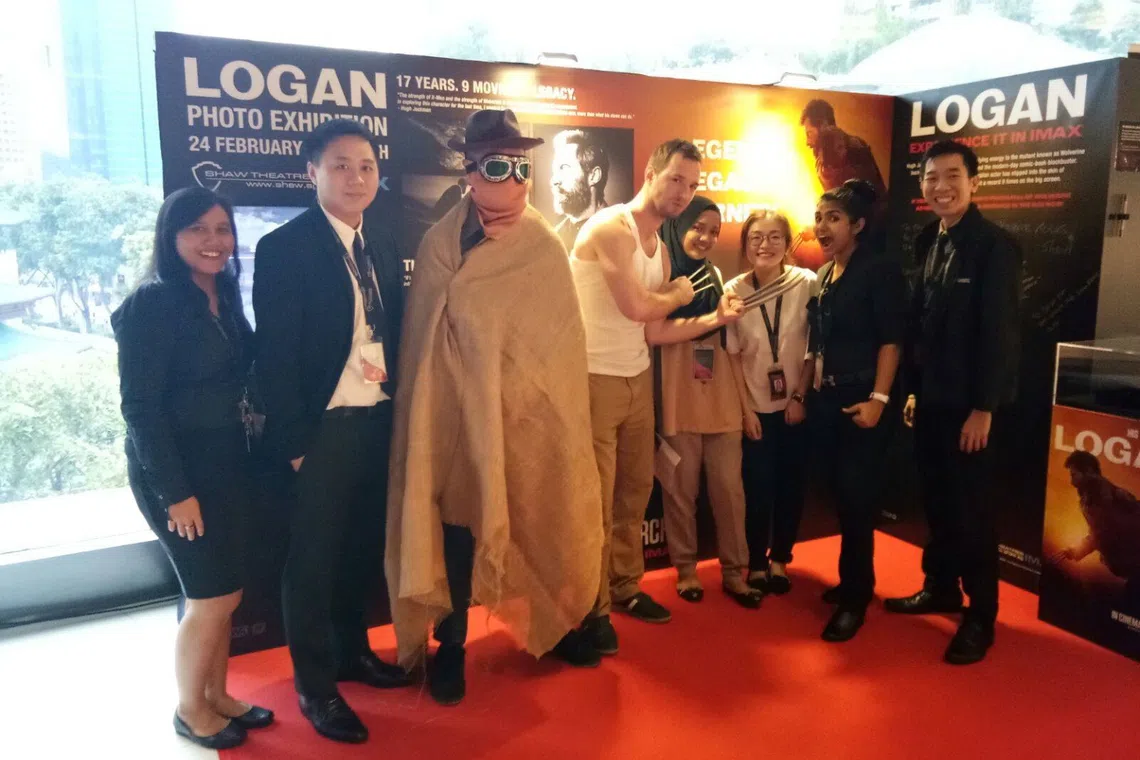
As a cinema outlet manager for over five years, Mr Tan (right) dealt with many different scenarios related to cinema operations, from hosting movie premieres to pop-up exhibitions.
PHOTO: COURTESY OF JOEL TAN
The biggest difference is the impact – at the cinema, I created momentary experiences. At SPS, I have the opportunity to help uplift lives and make a lasting impact that can ripple through families and communities.
One unexpected bonus is the mandatory fitness requirements for officers – I have become fitter, and I get to do work that I am passionate about, all while being paid for it!
Q: Tell us about your career. What did you start off as, and what does your current role entail?
Every officer’s journey at SPS begins with basic prison officer training at the Singapore Prison Training Institute at the Home Team Academy. Over nine months of intensive training, we receive comprehensive training in areas such as correctional knowledge, scenario-based situations, physical fitness and tactical skills. Training was tough, but it equipped me with the confidence to navigate the dynamic and unpredictable nature of the job.
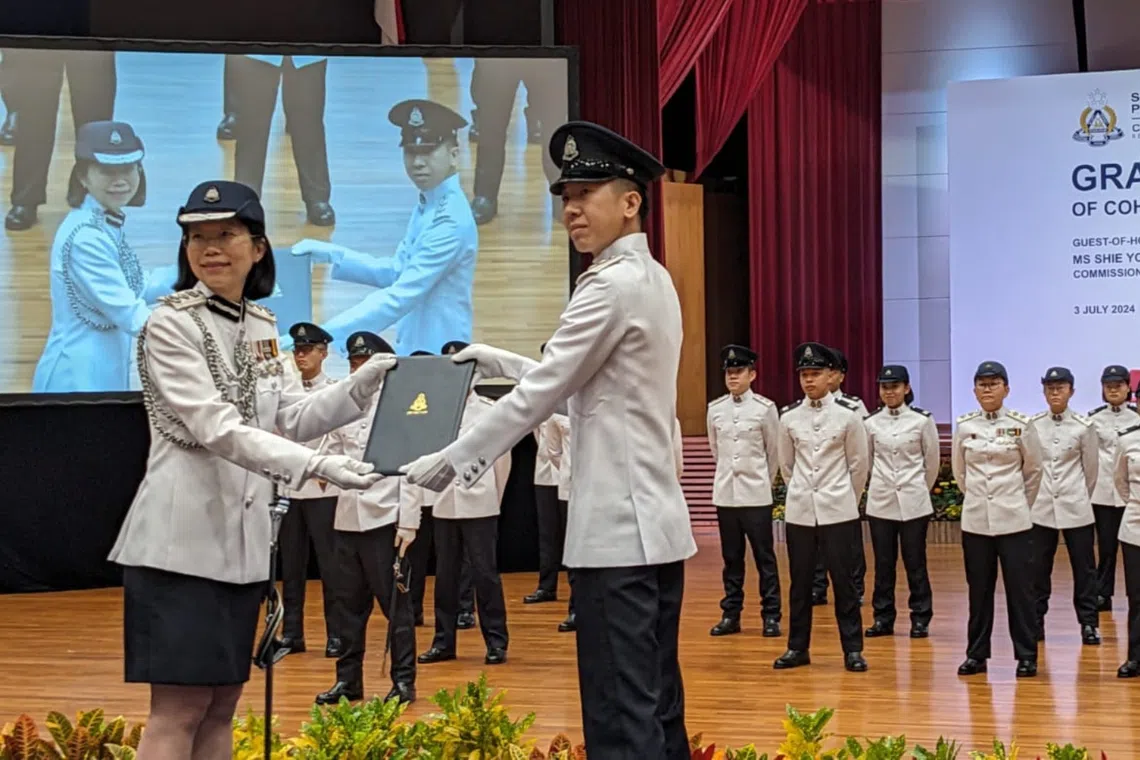
Mr Tan graduated in 2023 after nine months of intensive training, which comprised six months at the Home Team Academy and three months on-the-job at one of the prison institutions.
PHOTO: COURTESY OF JOEL TAN
After completing my training, I was posted to my current role as a Senior Correctional Unit Officer, leading a team to ensure we manage and care for the inmates in Institution B5. We work on a rotational shift system with two other teams to always maintain smooth operations.
Beyond managing security, my team and I actively guide inmates on their reintegration journeys. We do this by delivering tailored drug rehabilitation programmes, such as psychology-based correctional programmes, family programmes and vocational training.
These programmes are developed to equip inmates with the necessary skills for life after prison, and we also collaborate closely with other departments and organisations to ensure these initiatives are effective and impactful.
Q: How do you stay motivated and inspired in your role?
I focus on the impact we can make. Offenders are going through their own personal journeys of change that can be filled with challenges. We should not judge them but rather, help them change for the better.
Taking the time to understand an inmate’s personal struggles and what makes them receptive to positive change is key. This helps us build meaningful connections that support their rehabilitation.
In a dynamic work environment like ours, strong team camaraderie makes all the difference. I am grateful to be part of a team where we trust and respect each other, whether we are taking breaks or facing high-pressure moments. It is reassuring to know we are all on the same page, working towards the same goals, and that we always have each other’s backs.
Our middle and senior management also hold an open-door policy and regularly check in on our personal well-being to reinforce such a supportive work environment.
On top of that, SPS really looks out for its officers’ well-being and growth. We are often encouraged to join Correctional Unit (CU) outings, cluster appreciation events and a range of complimentary activities outside of work. These not only give us a chance to unwind but also help us bond with colleagues and connect with others across the organisation in a more relaxed setting.
With all this support from SPS, we are able to support our inmates knowing that our own needs are met.
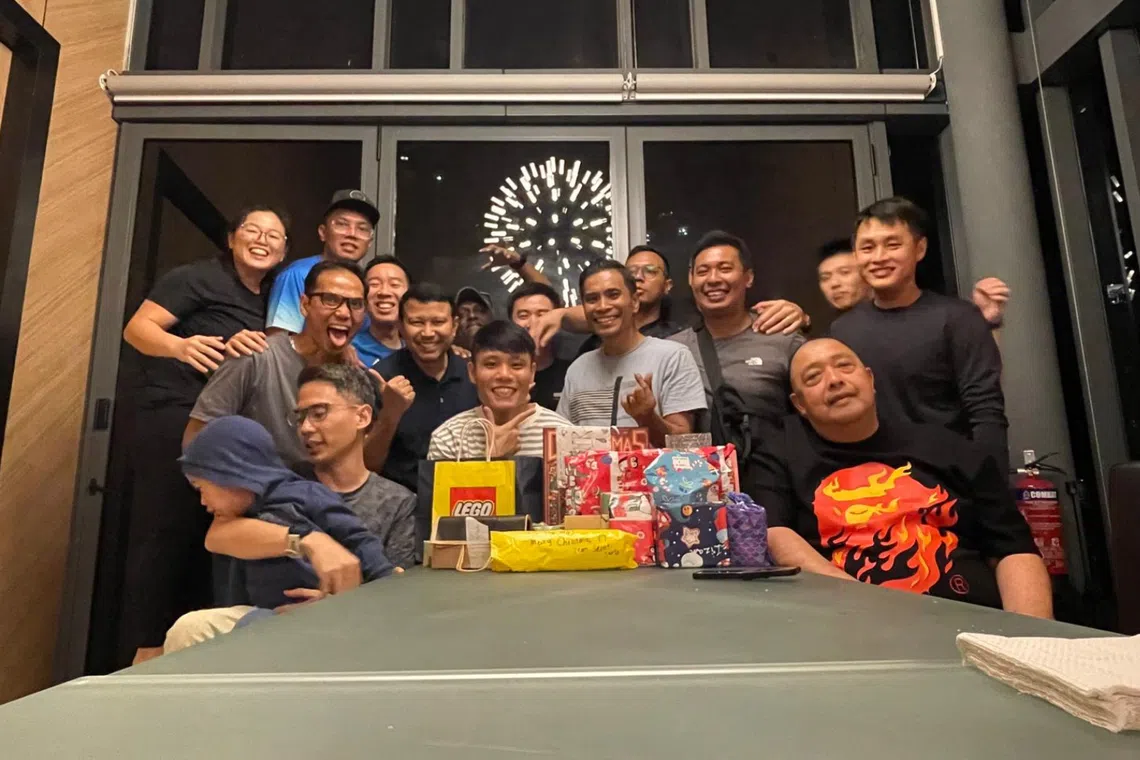
Having regular outings with his Correctional Unit helps Mr Tan (top row, third from left) to bond with his teammates and get to know them on a deeper level.
PHOTO: COURTESY OF JOEL TAN
Q: How do you balance empathy with the need for security and discipline in your role?
Empathy, security and discipline are not two ends of a scale. They can be implemented concurrently at the right time. All these factors are equally important to ensure the success of an inmate’s rehabilitation journey.
For instance, enforcing rules firmly ensures order and discipline, while empathy allows us to understand an inmate’s concerns and challenges. Playing such a dual role – as a disciplinarian to ensure a safe and secure environment where rehabilitation can take place, as well as a mentor to guide inmates on their journey of change – is unique to our work, and a very exciting as well.
Q: What are the biggest challenges of your role?
Rehabilitation can be both rewarding and demanding. Inmates often face deeply ingrained struggles, such as addiction or cycles of intergenerational offending. It is our job to provide them a safe space to reflect on their past, assess their strengths and weaknesses, and help to rebuild their lives.
Building supportive relationships is essential in helping inmates develop emotional resilience and self-confidence. For instance, we facilitate group support sessions and encourage peer support among inmates to create a sense of community and accountability.
The emotional demands of correctional work require resilience from us as officers, too. We must balance empathy with the ability to de-escalate tense situations effectively.
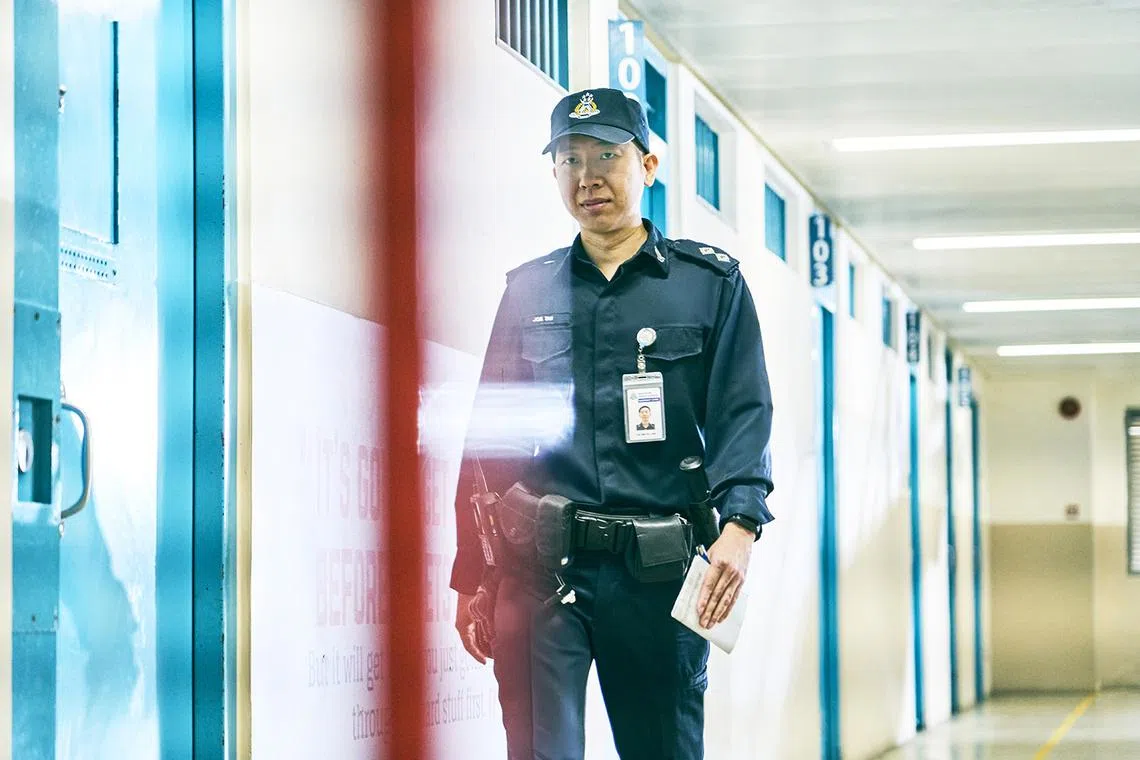
Mr Tan plays a dual role as a prison officer – ensuring discipline for a safe and secure environment while mentoring inmates on their path to rehabilitation and change.
PHOTO: SPH MEDIA
Q: What do you find most fulfilling about your work?
The most rewarding part of my job is seeing change. When inmates thank me for taking the time to discuss life matters or when I see them commit to positive actions, I feel that I have achieved what I set out to do in SPS.
I once worked with an inmate who was known for his disruptive behaviour against authority figures. After various rehabilitation programmes, together with his own commitment to change, we witnessed a remarkable transformation.
By the time he left the CU for the next phase of his rehabilitation journey, he became a CU attendant and was a role model for other inmates.
The thought of how our daily interactions and support might play a small part in guiding these individuals towards a more positive path in life is incredibly motivating. It is the prospect of these positive outcomes that drives me at work.
Q: What are some misconceptions about being a prison officer?
Many people think our job is solely about locking and unlocking cells or dealing with violent inmates. In reality, a large part of our work revolves around rehabilitation – helping inmates change for the better and reintegrate into society.
Another common misconception is that you need to have a physique like the Hulk to be fit for this role. While physical fitness is important, resilience, empathy and interpersonal skills are just as critical. With proper training, anyone can build the necessary fitness over time.
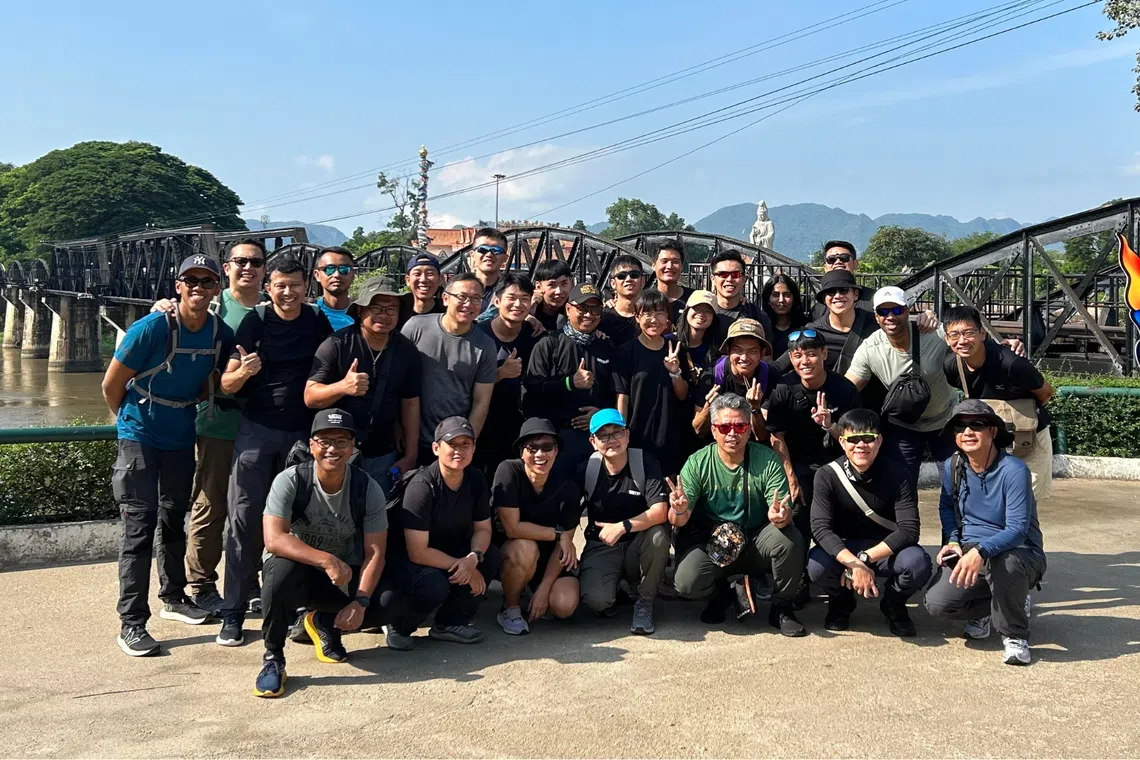
As part of his nine-month training, Mr Tan (top row, third from left) got the chance to go to Kanchanaburi, Thailand, for a climbing expedition to hone leadership skills.
PHOTO: COURTESY OF JOEL TAN
Q: What advice would you give to those considering a career at SPS, or a mid-career switch like yourself?
If you are passionate about making a difference, this role offers a unique opportunity to impact lives and grow as a person. Being part of “Captains of Lives”, as SPS calls its officers, allows you to inspire hope in and guide inmates toward a brighter future they may have believed impossible.
Do not let age or background hold you back – I joined SPS at 35, and my life experiences have been invaluable in this role. The support provided by SPS will help you to ensure a smooth transition.
Find out more about the career opportunities in SPS.


